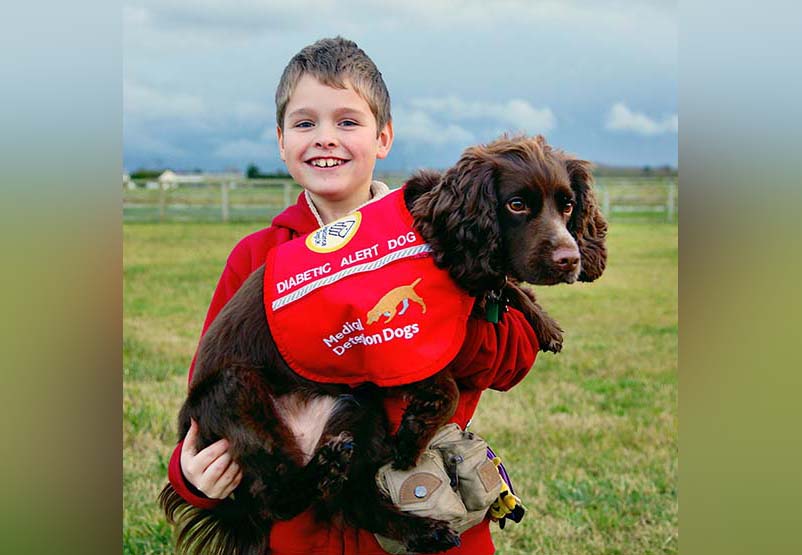Dr Randhir Singh
In a world where science has advanced and medicine has made significant strides, a wonderful cooperation that goes beyond the realm of science and draws on the intrinsic powers of our animal friends has evolved. Dogs, known for their steadfastness and acute perception, are increasingly playing responsibilities that go far beyond those of simple companionship: they are indispensable medical alert partners. These wonderful creatures are proven to be lifesavers for people with a variety of medical issues thanks to their amazing capacity to spot changes in human health. From the days of early human civilizations to the present age, dogs have stood alongside humans as trusted companions. The journey from wild wolves to domesticated dogs was marked by mutual benefit-while humans provided food and shelter, dogs offered protection and assistance in hunting. This interdependence laid the foundation for a bond that would flourish over the centuries.
A Natural Gift for Detection
Dogs have an exceptional sense of smell, which humans have long used to their advantage. Their function as medical alert partners is underpinned by this keen sense of smell. Dogs can detect minute changes in scent that are frequently undetectable to humans because their noses are tens of thousands of times more sensitive than those of humans. The foundation of their capacity to recognise changes in the body that are suggestive of numerous medical disorders is their enhanced sense of smell.
Medical Alert Abilities
Dogs as medical alert partners have demonstrated the ability to detect a range of medical conditions, making them valuable assets for individuals with specific health needs:
Diabetes: Some dogs have been trained to detect decreases or increases in diabetic patients’ blood sugar levels. These dogs warn their owners in advance of possible hypoglycemia or hyperglycemia, enabling prompt intervention.
Seizure Disorders: Some dogs are trained to recognise minute scent changes that happen before a seizure. Individuals can take necessary precautions and get ready at crucial times thanks to their capacity to predict seizures.
Allergies: Allergen-detection canines can recognise substances that may cause allergic reactions in humans, including nuts, gluten, and even specific odours. Their presence can help manage allergies and prevent unintentional exposure.
Narcolepsy and Sleep Disorders: Dogs can detect changes in behaviour and body language that signal an impending sleep episode for individuals with narcolepsy or other sleep disorders. Their alertness helps create a safer environment.
The Science Behind the Sensation:
The process of turning dogs into medical alert partners is proof of the effectiveness of positive reinforcement and the relationship that exists between people and animals. While some dogs have a natural aptitude for smell detecting, accurate training is essential to hone their abilities. Dogs are trained to recognise and alert to particular odours linked to a particular medical condition using reward-based training methods. These canines learn to recognise and react to medical signs through practice, positive reward, and a thorough understanding of canine behaviour.
Impact on Daily Life
The lives of people with medical illnesses can be positively affected by the presence of a medical alert dog. The early warnings that these dogs give can help people with diabetes avoid dangerous episodes of hypo- or hyperglycemia. People who might otherwise be restricted by the unpredictable nature of their condition benefit from the sense of security and independence provided by seizure-alert dogs. Canines that can detect allergens help people navigate their surroundings with more assurance, while canines that can treat sleep issues make daily life more liveable.
The Unbreakable Bond
The bond between a human companion and a medical alert canine goes beyond the scope of detection. The connection that develops is based on mutual trust, camaraderie, and goal-sharing. As quiet sentinels, these dogs become continually watchful of changes in their owner’s health. As a source of emotional support, their loyalty and dedication enable people to face the difficulties posed by their medical problems with greater resiliency.
Challenges and Future Potential:
Even while dogs have a lot of potential as medical alert partners, there are still difficulties. The public awareness issue, ensuring the accuracy and dependability of notifications, and facilitating accessibility are issues that need constant attention. Additionally, further studies are required to determine the full extent of dogs’ skills to identify an even wider spectrum of medical issues.
A Symphony of Senses and Saving Lives:
Dogs serving as medical alert partners are a wonderful example of how humans and animals may live in peace together when the requirements of both species are met. Their exceptional capacity to spot changes in health problems goes beyond what is currently understood scientifically and touches on the human capacities for empathy and compassion. These incredible creatures redefine what it means to be a reliable partner-they are steadfast, watchful, and devoted. We discover fresh opportunities for medical assistance, hope, and life-saving measures as we continue to investigate the potential of this mutually beneficial partnership. The future of medical alert dogs is proof that there are countless opportunities that open up when we utilise the skills that our canine partners already possess to enhance the lives of people.
(The author is a leading veterinary dialysis specialist )
Trending Now
E-Paper


